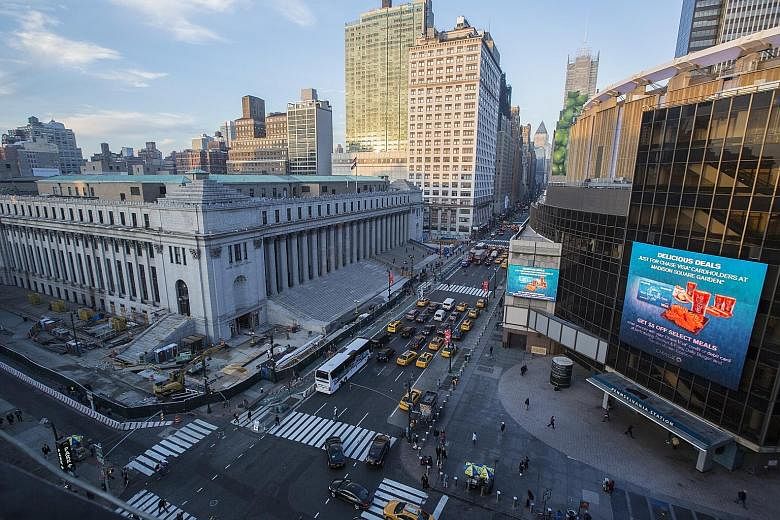NEW YORK • When Facebook was searching for another New York office to fit as many as 6,000 workers, it had one major demand. It needed the space urgently.
So after the company settled on Hudson Yards, a vast mini-city taking shape on Manhattan's Far West Side, existing tenants were told to move and a small army of construction workers quickly began to revamp the building even before a lease had been signed.
Facebook's push to grow its booming operations is part of a rush by the West Coast tech giants to expand to the East Coast, to New York City in particular. The rapid growth is turning a swathe of Manhattan into one of the world's most vibrant tech corridors.
Four companies - Amazon, Apple, Facebook and Google - already have big offices along the Hudson River, from Midtown to Lower Manhattan, or have been hunting for new ones in recent months, often competing with one another for the same space.
In all, the companies are expected to have roughly 20,000 workers in New York by 2022.
Cities across the United States and around the world have long vied to establish themselves as worthy rivals to Silicon Valley. New York City is certainly not anywhere close to overtaking the Bay Area as the nation's tech leader, but it is increasingly competing for tech companies and talent.
New York's rise as a tech hub comes as industries that have long dominated the city's economic landscape are transformed by technology, and are themselves increasingly reliant on software engineers and other highly skilled workers.
The growth in New York is occurring largely without major economic incentives from the city and state governments. Officials are mindful of the outcry last year over US$3 billion (S$4 billion) in public subsidies that Amazon was offered to build a corporate campus in Queens.
The retail behemoth, stung by the backlash, cancelled its plans abruptly last February. But it is continuing to add jobs in the city, although at a slower pace.
Still, Amazon's announcement last month that it would lease space in Midtown for 1,500 workers, has renewed a debate over whether incentives should be used to woo huge tech companies to New York.
Tech firms are choosing New York to tap into its deep and skilled talent pool and to attract workers who prefer its diverse economy over tech-dominated hubs on the West Coast. The city is also closer to Europe, an important market.
"For a long time, if you lived in the broader tech sector, there was inertia that brought you to Silicon Valley," said Ms Julie Samuels, executive director of Tech: NYC, a non-profit industry group. "So many people wanted to live here and move here, but felt the jobs weren't here. Now the jobs are here."
Google has grown so quickly and is so squeezed for space that it is temporarily leasing two buildings until a much larger development in Manhattan near Holland Tunnel, St John's Terminal, is ready in 2022.
The big tech firms started in New York with small outposts. Google's first New York employee, a sales worker, arrived in 2000, and worked out of a Starbucks in Manhattan. It was the company's first office outside California.
Tech industry offices were once mostly filled with sales and marketing employees who needed to be closer to their customers and to industries such as fashion, finance, media and real estate that power the city's economy.
At Google's New York office, highly skilled workers now outnumber their colleagues in sales and marketing.
Of the nearly 800 job openings that Amazon has in the city, more than half are for developers, engineers and data scientists.
"Every line of business and every platform is represented quite healthfully," said Mr William Floyd, Google's head of external affairs in New York, the company's largest office except for its Mountain View, California, headquarters. "Not everyone wants to be in California."
The number of tech jobs in New York City has surged 80 per cent in the past decade, to 142,600, from 79,400 in 2009, according to the New York State Comptroller's office.
The business services industry, which includes accountants and lawyers and is the largest private sector, employed 762,000 people in 2018.
Industries such as finance, retail and healthcare provide more jobs, but the tech sector, with an average salary of US$153,000, has become one of New York City's main economic drivers.
That has raised concerns about whether the industry is intensifying income inequality and making New York unaffordable for more people.
The four big tech companies "attract thousands of out-of-state employees with higher degrees and work experience, and drive unprecedented influxes in luxury rentals, rent hikes, and the flipping of buildings and private homes", said Ms Kiana Davis, a policy analyst at the Urban Justice Centre.
Mr Jonathan Miller, president of a real estate appraisal firm, said that the residential market in Manhattan has been strong in areas where the tech firms have grown.
"I speak to brokerage groups twice a week, and the conversation is always peppered with questions about the tech sector," he said. "If you have 20,000 employees coming in who are high-wage earners, that can have a pronounced impact."
NYTIMES

